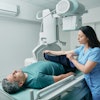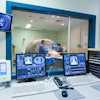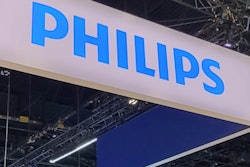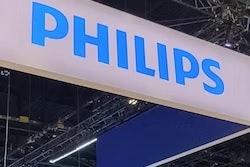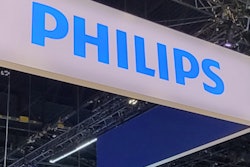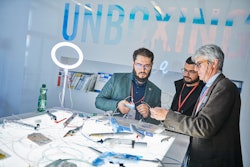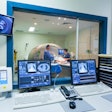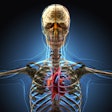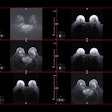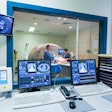VIENNA – Philips brought a clutch of new products to ECR 2024, including two image-guided therapy systems and a new CT scanner.
In the image-guided therapy section of its booth, the company unveiled its Azurion neuro biplane system. Designed to support diagnosis, image guidance, and therapy assessment of neurovascular patients, Azurion neuro biplane integrates images from two x-ray detectors into a 3D view and can serve as a complete interventional system, according to the vendor.
The system includes Philips’ latest Neuro Suite software and services, its ClarityIQ image processing software, and neuro-specific tools, the company said. What’s more, Philips has incorporated features such as enhanced C-arm rotation, angulation, and parking facilities to enable a rapid transition from 2D to 3D imaging.
 Philips' new Azurion neuro biplane system. Image courtesy of Philips.
Philips' new Azurion neuro biplane system. Image courtesy of Philips.
With complete table-side control, there’s also no reason to leave the sterile field, according to the firm. Other new additions on Azurion neuro biplane include automatic beam rotation to obtain correctly oriented images for every angulation, as well as a new head immobilizer to support stroke care.
In other image-guided therapy news, Philips unwrapped Zenition 90 Motorized mobile C-arm. The system features automated workflows, “intuitive” motorization for improved table-side control by surgeons, as well as high power (25 kW) to support vascular needs and clinical procedures such as cardiac interventions, pain management, and urology, according to the vendor. Image controls can be performed on a touch-screen module.
In usability studies involving clinicians who have utilized Zenition 90 Motorized in simulated environments, all users reported that they had complete control over C-arm movements when using the Table Side Operator function, Philips said. Furthermore, 97% indicated that they believed workflow features such as the system’s Automatic Vascular Outlining tool would help save time during procedures, according to the company.
 Philips' Zenition 90 Motorized mobile C-arm. Image courtesy of Philips.
Philips' Zenition 90 Motorized mobile C-arm. Image courtesy of Philips.
Philips expects to make Zenition 90 Motorized commercially available in the second quarter. A nonmotorized version will also be available. The system is currently pending U.S. Food and Drug Administration (FDA) clearance.
The vendor noted that it employed its EcoDesign process for Zenition 90 Motorized, which enabled product life and power efficiency to be increased by 25% and 13%, respectively, compared with Zenition 90 Motorized’s predecessor: Zenition 70.
CT
In its CT area, Philips showcased CT 5300, a workhorse scanner that’s also capable of handling cardiac scanning. AI plays a significant role in all operational aspects of CT 5300, providing benefits in diagnosis, interventional procedures, and screening, according to the vendor.
The system features Nanopanel Precise, a new detector developed by Philips specifically for AI-based reconstruction. Making use of the firm’s Precise Image reconstruction software, CT 5300 can achieve up to 85% lower noise and 60% better low-contrast detectability at 80% lower dose in comparison with conventional image reconstruction, Philips said.
For cardiac imaging, the Precise Image software combines with Precise Cardiac software to produce motion-free cardiac imaging in patients with high heart rates or heart rate variability, according to the firm.
The scanner also includes virtual tools such as the firm’s CT Collaboration Live service for real-time collaboration and clinical or technical support. Philips noted that CT Collaboration Live and the use of Precise Image for cardiac scans have not yet received FDA 510(k) clearance. In addition, Philips is highlighting the scanner’s sustainability and lifetime value.
CT 5300 has been installed at several European hospitals so far.
MRI
In MRI, Philips highlighted developments with its “virtually” helium-free MRI program. The company said that more than 1,000 MRI scanners equipped with its BlueSeal magnet have been installed worldwide and have saved more than 1.9 million liters of helium since 2018.
Joining forces with Swedish MRI software developer Synthetic MR, Philips also introduced Smart Quant Neuro 3D, an AI-based software application for quantitative brain imaging. Smart Quant Neuro 3D integrates Philips’ Smart Speed image reconstruction technology, Philips 3D SyntAc, and Synthetic MR’s SyMRI Neuro 3D quantitative tissue assessment software. The combined software can assist in diagnosis and treatment assessment for brain disorders such as multiple sclerosis, traumatic brain injury, and dementia.
In comparison with Philips’ SENSE technology, Smart Quant Neuro 3D can increase imaging speed by a factor of nearly three times while providing up to 65% greater resolution, according to the firm. In less than 10 seconds, Smart Quant Neuro 3D automatically performs 3D segmentation and volume measurements of brain tissue such as white matter, gray matter, cerebrospinal fluid, and myelin, the company said.
For more news from ECR 2024, click here.
